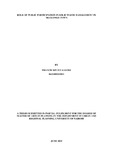| dc.description.abstract | Rapid economic growth and industrialization of the developing countries has created serious
problems of solid waste disposal due to uncontrolled and unmonitored urbanization,
inadequate inclusion of the waste generators (the public) and financial and human resources.
This research is culmination of a study carried out to investigate the role public participation
in solid waste management. The main problem of concern is the lack of public inclusion in
provision of basic services and infrastructure such as solid waste management. The study was
carried out in Mlolongo Town which is located on the fringes of Nairobi City within Machakos
County. The objectives of the study were to establish how solid waste is organized, the current
and potential role the public play to achieve effective SWM, the major challenges of
involving the public SMW and exploring ways of improving the same in Mlolongo. The
study used a descriptive research design. A total of 196 households’ randomly sampled
respondents were interviewed. Three focus group discussions were held and three key
informants interviewed. The collected data was analyzed using Statistical Package for Social
Sciences (SPSS). The study found that, SWM was carried out by private solid waste
collectors, cart pushers, resource merchants, public, estate and neighbourhood associations
and the County Government who collect and transport waste to a dumping site. The public
played roles of waste collection, financing, sorting, transportation and recycling. Potential
roles include composting, waste separation, involvement of children in SWM, introduction of
solid waste containers and reuse of waste. Identified challenges of involving the public in
SWM were inadequate resources, poor attitudes, averseness to participation and SWM
knowledge gaps. The study recommends active public participation in SWM, sensitization of
the public, social networking with good-willed individuals, prioritization of SWM during
annual budgets and plans to cover knowledge gaps of the people with an ultimate aim of
empowering, motivating and provoking them to constantly think of effective and efficient
ways of SWM. Further research is required to explore the potential for enormous solid waste
reduction at household level, potential for waste recycling and the possibilities of complete
privatization of Solid Waste Management in Mlolongo and other similar towns | en_US |

